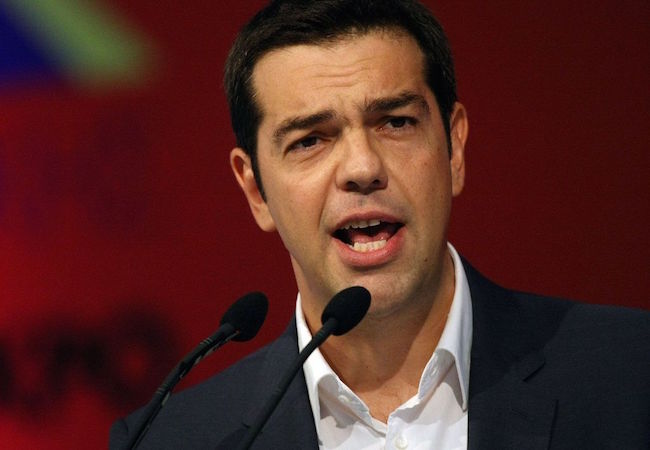
By Alexia Vlachou, Maria Spiliopoulou
Greek Prime Minister Alexis Tsipras began his visit to Moscow on Wednesday, and before that, the country’s Finance Minister Yanis Varoufakis travelled to Washington on Easter day.
The visits come at a time when the slow pace of negotiations between Athens and its international creditors over the resolution of the Greek debt crisis has refueled scenarios of an imminent rift, a Greek default this April and a subsequent Grexit from the euro zone.
Then the inevitable questions emerge: does Greece turn to Russia and the U.S. for the solution to the debt crisis? Do its European partners have reasons to fear that Greece could distance itself from the EU while seeking alternate funding and support elsewhere?
Greek government officials have reassured in several cases recently that Greece will not switch course and change partners dramatically. Greece would rather pursue a multifaceted foreign diplomacy that will benefit all sides, the country’s Foreign Minister Nikos Kotzias has said.
Ahead of the meeting between Tsipras and Russian President Vladimir Putin, Greek Minister of Productive Reconstruction, Environment and Energy Panagiotis Lafazanis argued in an interview with a Greek newspaper that an agreement between Greece and Russia for the expansion of the Russian natural gas pipeline in Greece could improve Greece’s standing in negotiations with its European lenders.
In another interview with a Greek television channel, Greek Defense Minister Panos Kammenos said that in case of an impasse in talks with EU creditors, the government would reach agreements with anyone it could, pointing to the U.S., Russia, China, India and Middle Eastern countries.
After a string of meetings on Sunday and Monday with International Monetary Fund Managing Director Christine Lagarde, U.S. Treasury Department officials and President Barack Obama‘s chief economic advisor Caroline Atkinson, Varoufakis said his interlocutors explained the importance given by the Obama administration to an honorable agreement between Greece and its partners and to preserving a single euro zone.
“They also stressed that the U.S. government wished to play an honest broker role to ensure that such a solution would be reached as soon as possible,” according to a Greek finance ministry statement.
For political analysts in Athens, the rapprochement between Greece and Russia or other countries should not set off alarum bells across European capitals.
Experts saw nothing more than a bid to play the Russian or other cards in order to put pressure on European partners to release the vital funding to the debt-laden country in coming weeks.
Despite Athens’ aspirations, all its interlocutors have publicly stressed that any solution to the Greek debt crisis would come from within the current framework and the euro zone. Analysts did not see any other concrete alternatives on the horizon.
Talking of Tsipras’ visit to Russia, Thanos Dokos, director general of the Hellenic Foundation for European and Foreign Policy (ELIAMEP), said: “Premier Tsipras wants to send a message to Greece’s European partners that Greece ‘still matters’ in international affairs and that it could play the role of a complementary bridge between Moscow and the EU.”
Dokos said that, despite possible efforts by Russia to “lure” Greece – for example, by unilaterally lifting the counter-embargo for Greek agricultural products – the likelihood of Greece falling into Russia’s orbit or any other fundamental shift in strategic orientation is virtually nil as long as Greece remains a full member of the European and transatlantic institutions.
“However, a balanced evolution of Greek-Russian relations might allow Greece to become a complementary ‘bridge’ between the West and Russia, contributing quietly to the normalization of relations and the development of a functional strategic partnership between Europe and Russia,” Dokos told Xinhua.
Sharing this opinion was George Hatziioannou, editor of EIRANEWS.COM (Energy International Risk Assessment) website, who has served for three decades as press counsellor at the Greek Embassies in London, Moscow, Prague and the UN Greek Diplomatic Mission in New York.
Hatziioannou said: “Those fearing the Turkish Stream pipeline reaching Greece with Russian gas should be aware that Athens is pursuing a balanced foreign policy, rendering full support, for instance, to the TAP (Trans Adriatic Pipeline) project as part of the EU-sponsored and U.S.-blessed South Corridor.”
In a democratic Europe, all EU member states should be free to promote their interests in order to upgrade their economic and social situation, Hatziioannou stressed, explaining that Greece was not in danger of being isolated, mainly due to its geopolitical importance.
“The intention of the government of Alexis Tsipras to pursue a wise, balanced and peaceful policy will play a decisive role in escaping from the financial trap. Thus, Greece acting as a benevolent mediator, bringing together the European Union with foreign powers like Russia, China, the United States etc., to the benefit of all, is a policy worth pursuing,” he stressed.




